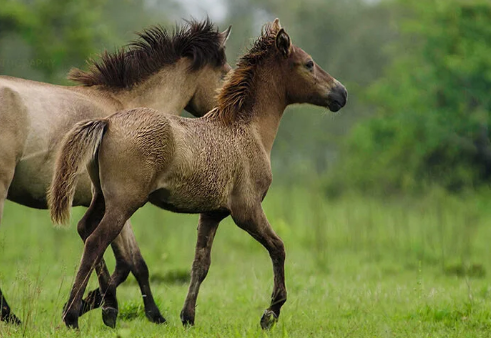Urgent Action Needed for Assam’s Feral Horses
The National Green Tribunal (NGT) has recently raised alarms regarding the critically endangered feral horses in Assam’s Dibru-Saikhowa National Park. These horses, unique to the park, are untamed descendants of domesticated horses and their numbers are dwindling, prompting the NGT to take immediate action to safeguard their future.
Background of Feral Horses
Feral horses in Dibru-Saikhowa National Park have existed in the wild for approximately 80 years. They are thought to have originated from war horses used during World War II. Some experts believe they may also descend from China’s Przewalski’s horse species.
Threats to Survival
Several threats endanger the survival of these horses. Habitat loss and reduced grazing areas have impacted their population. Additionally, smuggling poses a direct threat, while floods further exacerbate their plight. Conservation efforts remain insufficient, leaving these horses vulnerable.
The NGT brought into light that these feral horses lack protection under the Wildlife Protection Act. The absence of an official census complicates understanding their conservation status. The tribunal noted potential violations of both the Biodiversity Act and the Environment Protection Act.
NGT’s Actions
In response to a concerning news report, the NGT initiated action on its own. The tribunal has summoned various authorities, including the Union Ministry of Environment, Forest and Climate Change. Other parties involved include the National Biodiversity Authority and the Wildlife Institute of India.
The NGT has mandated that these authorities submit their responses by February 27. The tribunal’s eastern zonal bench in Kolkata will review the case. This action aims to address the pressing environmental concerns surrounding the feral horses.
GKToday Notes:
- Dibru-Saikhowa National Park: This national park in Assam is home to unique feral horses. It spans diverse ecosystems and is crucial for biodiversity conservation in northeastern India.
- Przewalski’s Horse: This rare wild horse species is native to Central Asia. It is considered the last truly wild horse species and has been crucial for equine conservation efforts.
- National Green Tribunal (NGT): Established in 2010, the NGT addresses environmental issues in India. It has the authority to enforce environmental laws and adjudicate matters related to conservation.
- Biodiversity Act: This Indian legislation aims to protect biological diversity. It establishes guidelines for the sustainable use of resources and ensures equitable sharing of benefits arising from biodiversity.
Month: Current Affairs - December, 2024
Category: Environment Current Affairs







